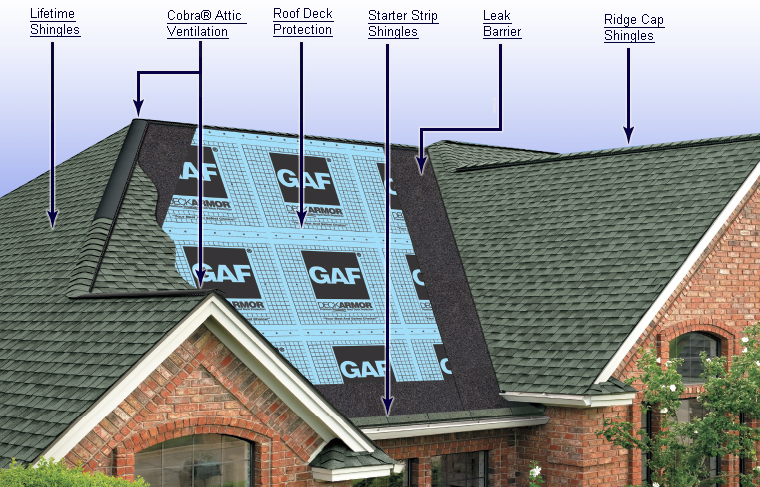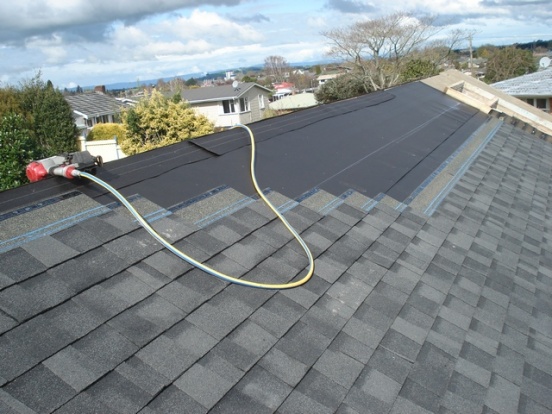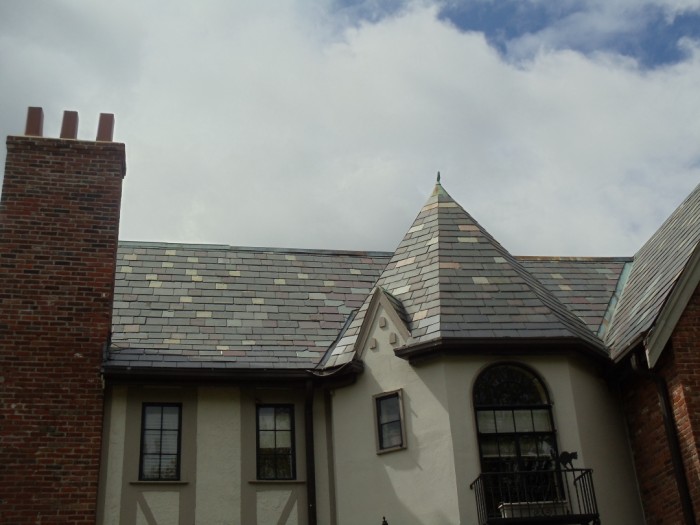How Much Does It Cost to Transfer Tags in Tn
We all want to get the best possible deal when it comes to spending our hard-earned money on home remodeling upgrades. However, there are some items that fall in the "never bargain shop" category. A new roof ranks high on that list. 😉

How Much Does a New Roof Cost?
A new asphalt shingles roof for a typical 2,000 to 2,200 square foot single-family house can range in price from $9,500 to $16,500 fully installed, including tear off and disposal of the old roof (up to two layers). The pricing can range greatly depending on the contractor choice, roof size and difficulty, and local real estate market conditions.
| $8,500 | $15,500 | $11,500 |
| | ||
Average Price Per Square Foot Across the US, a typical architectural asphalt shingle roof will cost between $4.00 and $6.00 per sq. ft. to install, depending on the brand and type of shingles, and project specifics variables. — This pricing range normally includes all the necessary materials and supplies, tear off and disposal of the old roof (up to two layers), dumpster and disposal fees, site plans and building permits required by the local building departments, professional installation, and a comprehensive contractor's workmanship warranty.
In the high cost of living areas like San Francisco Bay area, San Jose, Los Angeles, San Diego, Portland, Seattle, Portland, Boston, NYC, the greater Washington DC, and Northern Virginia, homeowners can expect to pay between $5.00 and $8.00 per sq. ft. to replace a roof on a typical 2,000-2,200 square foot house with mid-range architectural shingles like GAF Timberline or OC Duration. — This range exceeds the national average due to the disproportionately higher cost of living in expensive coastal cities compared to American heartland.
Note: The actual estimates homeowners receive can vary widely, depending on the location of the property (local real estate market), roof's overall complexity, and the type of system you choose to install. Quotes can also vary greatly from contractor to contractor in the same area, which is why it's so important to get several professional estimates.

Did you know? The average house size in America is roughly 2,200 square feet, with older homes usually being smaller in size and measuring between 1,500 Sq.Ft. to 2,000 Sq.Ft., on average. Newer built homes are typically larger in size, measuring between 2,400 Sq.Ft. and 2,600 Sq.Ft., on average.
However, the actual size of the roof surface can vary depending on how many levels or stories there are, the slope and type of the roof shape, and complexity of its architectural design (think a simple gable roof vs. a more complex hip and gable roof shape with dormers and valleys).
Varying factors that can affect your cost are the brand and type of shingles; the type of underlayment; roof slope; complexity of the job; the company installing the roof, and local real estate values.
Average Total Cost of Replacement on a 2,000-2,200 Square Foot House:
3-Tab Asphalt Shingles: $8,500 to $12,500
30-year Shingles: $9,500 to $16,500
50-year (Thicker) Premium Shingles: $10,000 to $18,500
EPDM Rubber Membrane: $8,000 to $14,500
TPO or PVC Membrane: $10,000 to $16,500
Wood Shingles: $14,000 to $25,500
Steel Shingles: $14,000 to $25,500
Aluminum Shingles: $15,000 to $27,500
Standing Seam: $18,000 to $29,500
Natural Slate: $25,000 to $50,500
Concrete Tiles: $25,000 to $40,500
Clay Tiles: $25,000 to $45,500
* These are approximate total job prices based on the national average. Costs may vary depending on your region and home's location, the roof's slope and number of stories, overall complexity of the roof, the number of layers of old shingles to be removed and disposed of the type of roofing underlayment (15 or 30 lbs. felt, and/or synthetic underlayment and whether it's breathable or non-breathable), roof accessories (like snowguards, solar vents or ridge vent) used, and any workmanship warranties or guarantees the contractor offers.
Getting a roof replacement is expensive. Seeing the total price of getting it done properly can cause a justifiable sticker shock. However, when homeowners have a better understanding of where the money is going and how they will save money in the long run, it's easier to see a quality roof as the investment it truly is.

Having a roof over your home is a basic, essential need. Yet, when the time comes to have a new roof installed, a typical homeowner will either pay too much by going through a local home improvement store like Lowe's or Home Depot, which by the way does not necessarily guarantee quality, or inadvertently, opt for a low-quality roof by hiring a contractor with the lowest bid.
Beyond the Basics
Many homeowners make these often-poor choices, because they don't really understand the importance of a good roof in the first place, as they lack general roofing knowledge, as well as fear getting ripped off, often justifiably so.
This guide will give you the knowledge necessary to hire a reputable contractor and get the best roof for your money.
Importance of a Quality Roof
Before getting into the actual roof prices, it's essential to establish the importance of a properly installed high-quality roof. A roof does more than keep the rain off your head. It protects your biggest investment – your home.
What you should expect from a high-quality roof:
Durability – Sufficiently long lifespan; stands up to high winds, heavy rain, snow, and hail; less maintenance; few replacements.
Protection – doesn't leak; protects the inside and outside of the structure; provides proper drainage; keeps family safe during extreme weather.
Efficiency – proper ventilation and insulation of the attic space; saves energy; lowers heating and cooling bills; helps HVAC equipment last longer; helps prevent ice dams, can offer possible local energy efficiency rebates.
Increased Home Value – If you're planning to resell your home, it will be worth more with a high-quality roof.
What you can expect from a low-quality roof:
Unreliable – vulnerable to premature leaks; can't stand up to pressure from snow; peels off in high winds.
Quite Temporary – short lifespan; deteriorates at a faster rate; high maintenance and unnecessary repair costs.
High Energy Costs – improper ventilation and insulation decrease energy efficiency; high energy bills; heating and cooling unit must work harder.
Potentially Dangerous – Low quality materials combined with improper ventilation can be a fire hazard and cause mold issues.
Consider the following examples: One of the most popular residential roofing materials is the basic 3-tab asphalt shingles, because they have the lowest up-front cost.
However, 3-tab shingles are rather thin and can fail when exposed to strong winds or rapidly changing temperatures. As a result, 3-tab shingles will normally last less than dimensional or architectural shingles.
Thus, although you may pay less up front, frequent roof replacements can make the least-costly option more expensive over time.
Metal roofs do have a higher initial price tag, but a durable and energy-efficient metal roof will help you save money in the long run.
Many residential metal roofs are offered with a lifetime warranty, are surprisingly energy efficient, and require little to no maintenance. Plus, they come in a variety of styles and colors to match anyone's taste and local flair.
When weighing the price of a new roof against the value received, homeowners need to look beyond the upfront cost, and consider long term savings and added benefits a quality roof can provide.
Remember, lower price doesn't always mean less expensive
Choosing a Trustworthy Roofer
Unless you personally know a contractor, the thought of finding a reputable company can be overwhelming, to say the least. Between horror stories of people getting blatantly ripped off, the fly-by-night crews and storm chasing contractors, it can be hard to know who you can trust.
Use these steps to find a reputable roofer:
1. Ask friends and family for recommendations.
— If your friends and family don't know any good contractors they can recommend, then do some online research to identify top local contractors that seem transparent and have solid reviews across different sources.
2. Once you have a list of prospects, call them, and ask these questions:
- Do they take on projects of your size? This one will almost always be a Yes, but it is a good starting point to get the contractor's interest and attention
- Can they supply a list of previous clients as references?
- Are they willing to provide financial references from banks and suppliers?
- How many other projects will they be working on while doing your roof?
- Will they be using subcontractors? If so, how long have they worked with them?
This information will tell you how reliable they are, how much attention they'll give to your project and how smoothly the work will go.
3. From your phone conversations, choose three to four contractors to come to your home for estimates. Don't go on personality alone! Be sure to check their reputation with their past clients and/or BBB, rip off report, Angie's List if you have it, etc.
4. Follow up on the information you've gathered. Call their clients to see if they are satisfied with the work and service they've received.
5. When prospective contractors visit your home, they should inspect the roof, along with the attic insulation and ventilation system in place. If you have a rather complex roof, they may ask to see the blueprints if you have them, which can help with the measurements and ordering of materials.
When discussing your needs, make sure they fully understand your expectations in terms of the new roof including making sure that your new roof will be properly ventilated, debris removed, and that your house and landscaping will be properly protected if the old roof needs to be removed.
Make sure that you fully understand the product benefits, and warranty details for materials and labor. The contractor should be eager to answer any questions you may have, as well as have questions and suggestions for you.
You will also want to make sure that the company has all the necessary roofer's liability and worker's comp insurance, and that they will be getting a permit for the job. You may also want to check their contractor's license if it's required in your state.
6. To accurately compare bids, ask for a breakdown of the contractors' estimates. The estimate should include cost of materials, labor, other expenses and overhead, and profit margin. Remember if companies aren't making profits, they won't be around to cover your warranty.
— Note that many professional estimates will not itemize or show the contractor's profit margin and/or list their overhead expenses.
However, the estimate should specify the brand and type of roofing material being installed, type of underlayment, Ice-and-Water moisture barrier for roof edges and valleys, deck repair provisions (how deck repairs are handled, flashing work to be done, removal and disposal of the old roof (if agreed upon), and accessories such as snowguards, vents, etc.
7. Throw out the low-ball bid. If an offer seems too good to be true, it probably is.
8. Go with your gut. You must be comfortable with not only their ability to do the work, but also how you feel around them. Trust is a major factor when hiring a contractor. They'll be at your home for several days; you need to feel comfortable talking to them; as well as get a sense that they are being fair and honest, especially if unexpected issues arise during project.
Tip: You do not want to do business with a contractor who seems pushy and impatient with your questions.
More on the Importance of Hiring a Reputable Contractor
It can be very tempting to go with the crew offering to save you money on such a large investment. However, when you choose a company based purely on the lowest bid, it will likely cost you more in the long run.
What you can expect from a disreputable roofer:
- They are likely to cut corners to save time on installation at your expense.
- They are likely to use low quality materials.
- They don't necessarily adhere to the building codes.
- They often hire uninsured, illegal immigrant workers.
- They go through a job too quickly, thereby not doing quality work.
- They're often not properly insured.
- They're usually not licensed, if licensing is required in your state.
Your roof will only likely look good for a short time. When you start having problems with your roof, and you will probably have problems, they won't be around to uphold your warranty.
Of course, hiring someone who is skilled in his trade and takes pride in his work will cost more than a fly-by-night organization. But you get what you pay for.
What you can expect from a reputable roofer:
- Honest contractors understand their services are often needed when people are unprepared and can least afford it.
- They will work out a financial plan that works for you or have a list of reputable lenders.
- A reputable company will sit down with you, listen to your concerns, your financial limitations, and your needs.
- A good roofer will do everything they can to give you the best roof and roofing design including ventilation and flashing details available.
- If something happens to your roof, they will be there to fix it. – Their reputation is more important to them than a "few extra dollars" they may earn in the short term.
- Reputable roofers understand that sometimes clients truly just need a roof over their head and can't afford the best roof on the market. In these cases they will work with you to give you the best value engineered roof you can afford.
How Contractors Determine the Price of a Roof Replacement
After inspecting the roof and speaking with homeowner, a contractor will draw up an estimate for the project. Estimating takes several important factors into consideration including materials, complexity of the job and the amount of time needed to complete the job.
Typical Breakdown of Factors:
Roof Size – Roofs with steeper slope have a larger surface area than roofs with less slant.
Roof Slope – Steeper sloped roofs are more dangerous and more difficult to work on than flat roofs.
Roof Complexity – A roof with more level changes, hips and valleys, and add-ons, such as dormers, will be more expensive than a simple roof.
Existing Layers – It's sometimes possible to install over existing shingles, but this lowers the lifespan and can cancel the warranty. It's better to do a complete replacement. The more layers that must be removed will increase the price.
Debris and Waste Removal – Asphalt shingles, the most common material used, are considered hazardous waste, and must be disposed of properly.
Materials – The type of new material that will be installed, such as asphalt shingles, steel shingles, slate shingles, etc.
Building Materials – This covers all other materials needed to replace a roof including boards and plywood for the roof deck, nails, drop cloths, tarps, staples, calk, etc.
Roof Underlayment and Accessories – Underlayment and accessories are part of a system that makes the roof complete and watertight.
Underlayment can be a simple 30lb felt or tar paper. There are also more advanced roof deck protection options such as breathable synthetic underlayment and/or Ice-and-water shield that protects sensitive and leak-prone areas of the roof such eaves and valleys. Accessories include vent pipe boots, snowguards, and flashing materials.
Ventilation – Ventilation is very important for expanding the lifespan of a roof, increasing its energy efficiency and meeting building code requirements in some areas.
Did you know? Ventilation is one of the main areas where corners are often being cut by less reputable contractors.
* Make sure anyone you hire obtains all the required building permits and your roof meets all required building codes.
Labor Costs – Installation/labor costs will vary depending on the size and complexity of the job, the workers' experience and how long the project will take.
Overhead Costs – This covers the basic costs of doing business (insurance, advertising, taxes, permits, office space, equipment, trucks, office supplies, office staff, etc.).
Need a Pro? Check out Prices from Local Roofers:
How Much Does It Cost to Transfer Tags in Tn
Source: https://www.remodelingcosts.org/roof-replacement-cost/



 See what local pros charge
See what local pros charge
0 Response to "How Much Does It Cost to Transfer Tags in Tn"
Post a Comment